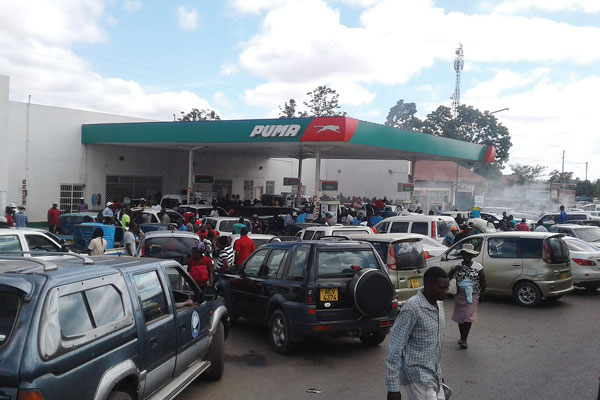
THE Zimbabwe Energy Regulatory Authority (Zera) has increased the prices of both petrol and diesel, effective today.
BY VENERANDA LANGA
In a statement last night, Zera said diesel would be sold at $24,93 per litre while petrol would go up to $28,96 per litre.
Zera last reviewed fuel prices last month, when it slashed the price of petrol from $21,77 to $21, and diesel from $21,52 to $20,84.
The country continues to face fuel shortages owing to foreign currency shortages, with long and winding queues now a permanent feature in most cities and towns.
This came as Reserve Bank of Zimbabwe (RBZ) governor John Mangudya yesterday said the country was looking at introducing a fuel smartcard for every vehicle owner in order to minimise what he said was indiscipline, arbitrage and inefficiencies in the fuel market.
The RBZ governor told the Parliamentary Portifolio Committee on Energy chaired by Bikita West MP Elias Musakwa (Zanu PF) that there was enough fuel in the country, but no one knows where it was going, resulting in suspicions of criminal activity.
“This raises questions on where that fuel goes to given the serious shortages,” Mangudya said.
- Chamisa under fire over US$120K donation
- Mavhunga puts DeMbare into Chibuku quarterfinals
- Pension funds bet on Cabora Bassa oilfields
- Councils defy govt fire tender directive
Keep Reading
He said between January and May 2020, fuel companies were getting fuel from the National Oil Company of Zimbabwe (NOIC) with 170 million litres disbursed in January, 106 million litres in February which was 60% diesel and 40% petrol and 143 million litres in March.
In April, during lockdown, there were no queues and 74 million litres were availed and 103 million litres in May, but surprisingly, even with 143 million litres in March, there were shortages and long queues, he said.
“There are many grey areas, indiscipline, inefficiency and arbitrage so it is not about demand and supply, but it is about enforcement because if we had 143 million litres in March then we need to find out where this fuel is going to,” Mangudya said.
“Indiscipline has become the order of the day and the figures that I have given do not warrant us having these long fuel queues and so now we are working with the Zimbabwe Energy Regulatory Authority (Zera), the Zimbabwe Revenue Authority (Zimra) and law enforcement agents to say maybe it is high time we introduce a fuel smartcard system.”
The RBZ governor said the fuel smartcard system was there in countries like India where they use it to monitor utilisation of fuel by service stations and vehicle owners. He said, for example, if a vehicle takes 1 000 litres of fuel in two days or everyday, the system will quickly pick up the irregularity.
“We need to do this as well as marking of fuel because we have serious challenges in this country. Even if we put 200 million litres of fuel into the economy, there will still be leakages and so we need to plug them,” Mangudya said.
He said the system would work efficiently if the Vehicle Inspection Department (VID), Zinara and the Zimbabwe Republic Police came up with an efficient vehicle registry system for the whole country and if the system is also backed by legislation so that it is not ultra vires any rights.
MPs grilled Zera acting chief executive officer Eddington Mazambani over fuel leakages and why some service stations were selling in United States dollars, getting fuel and selling a few litres in local currency, then close so that they clandestinely sell in US$.
Mazambani said there were a number of statutory instruments (SIs) that regulate fuel, including SI 65 of 2020 which was found ultra vires (breaking) the Petroleum Act, SI 161 for duty payable in foreign currency and SI 212 which stipulate that fuel can be sold in foreign currency to State guests and the March COVID-19 announcements where use of free funds was allowed, adding that sale of fuel in foreign currency was, therefore, legal.
“What is, however, worrying is a situation where people who sell in foreign currency access fuel through the RBZ and pay in Zimdollar, but then sell it in foreign currency. We have since gone to Zimra to ensure the whole value chain is in foreign currency. Direct fuel import (DFI) sites should sell fuel in US dollar,” Mazambani said.
He said Zera gave compliance orders to a number of fuel outlets, adding, “by next week, Harare should be disciplined”.
On shortages of fuel, Mazambani also blamed leakages where he said the regulator was ensuring availability but there could be criminal activity where fuel is bought in Zimdollar and smuggled out of the country.
Glow Petroleum owner and leader of the Indigenous Petroleum Association of Zimbabwe (Ipaz) Aaron Chimhara claimed his 77 members were being sidelined and were getting letters of credit (LCs) of as little as US$6 million per three months while major players like Engen, Total, Zuva, Puma and others got more.
“For example, Glow Petroleum’s capacity is bigger than Engen which gets LCs of US$25 million compared to US$6 million for Glow.”
He said they were not responsible for the fuel shortages and clandestine US dollar fuel sales in the country, adding that the last fuel from NOIC that Ipaz got was only 20 000 litres in March.
“Out of the 143 million litres in March, Ipaz got only 1,5 million litres, so where is the mischief because there is a myth that our members are the ones engaged in these activities,” Chimhara said.
But all major players said they were currently receiving 50% of their normal supplies of fuel and needed more supplies where 70% is dedicated to commercial use and 30% to other uses.
Some of the major fuel providers such as Puma said their percentage of DFI fuel was very low at 0,5%.











